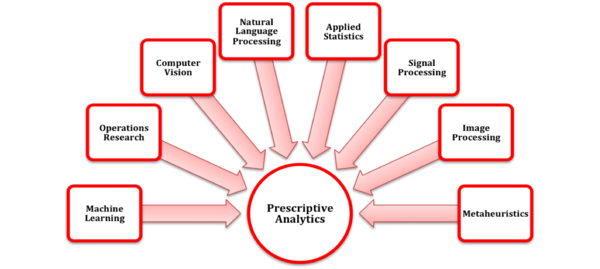The Power of Prescriptive Analytics: Guiding Decisions with Precision
Introduction:
The Prescriptive Analytics market Demand is projected to grow from USD 5.50 Billion in 2023 to USD 22.30 billion by 2030
In today's data-driven world, businesses and organizations collect vast amounts of information from various sources. The challenge lies in extracting meaningful insights from this data to make informed decisions. This is where analytics comes into play. Among various types of analytics, prescriptive analytics stands out as a powerful tool that not only predicts future outcomes but also prescribes the best course of action to achieve desired objectives. In this article, we delve into the world of prescriptive analytics, exploring its definition, applications, and benefits.
Defining Prescriptive Analytics:
Prescriptive analytics is an advanced branch of analytics that goes beyond descriptive and predictive analytics. While descriptive analytics examines historical data to understand past events and trends, and predictive analytics uses historical data to make predictions about future outcomes, prescriptive analytics takes it one step further by recommending the most optimal actions to achieve specific goals.
The primary objective of prescriptive analytics is to provide decision-makers with actionable insights. By combining data-driven methodologies, machine learning algorithms, optimization techniques, and domain expertise, prescriptive analytics helps organizations make well-informed decisions and maximize their efficiency.
Applications of Prescriptive Analytics:
-
Supply Chain Management: Prescriptive analytics can optimize inventory levels, distribution strategies, and transportation routes to minimize costs while ensuring timely deliveries.
-
Healthcare: In the healthcare industry, prescriptive analytics can assist in personalized treatment plans for patients based on their medical history, genetic data, and other relevant factors.
-
Financial Services: Prescriptive analytics can be employed to optimize investment strategies, detect fraudulent activities, and customize financial products for individual customers.
-
Marketing and Sales: By analyzing customer behavior, purchasing patterns, and market trends, prescriptive analytics can suggest targeted marketing campaigns and sales strategies to maximize conversion rates.
-
Manufacturing: Prescriptive analytics can optimize production processes, maintenance schedules, and resource allocation to improve overall efficiency and reduce downtime.
Benefits of Prescriptive Analytics:
-
Data-Driven Decision Making: Prescriptive analytics relies on real-time data, ensuring that decisions are made based on the most current information available. This leads to more accurate and reliable choices.
-
Enhanced Efficiency: By recommending the best actions to take, prescriptive analytics streamlines processes, reduces waste, and optimizes resource utilization, leading to increased efficiency and productivity.
-
Improved Risk Management: Prescriptive analytics can identify potential risks and offer mitigation strategies, helping organizations proactively address challenges and minimize the impact of adverse events.
-
Customer Satisfaction: Through personalization and targeted marketing strategies, prescriptive analytics can enhance customer experience, increasing customer satisfaction and loyalty.
-
Competitive Advantage: Organizations that leverage prescriptive analytics gain a competitive edge by making better-informed decisions, leading to improved performance and market positioning.
Conclusion:
Prescriptive analytics is a game-changer in the world of data analytics. By combining historical data, predictive modeling, and optimization techniques, it empowers organizations to make well-calculated decisions and achieve their objectives more effectively. From supply chain management to healthcare and finance, the applications of prescriptive analytics are vast and impactful. Embracing this powerful tool can lead to increased efficiency, improved customer satisfaction, and a stronger competitive advantage. As technology and data continue to evolve, prescriptive analytics will undoubtedly play an increasingly pivotal role in shaping the future of businesses and organizations worldwide.
Related Reports
Container Security Market - https://www.cyberdefensemagazine.com/newsletters/august-2023/files/downloads/CDM-CYBER-DEFENSE-eMAGAZINE-August-2023.pdf#page=42zoom=100,68,693
CAS9 Technology Market - The global CAS9 technology market size is USD 6.72 Billion expected to record a CAGR of 11.30% during the review period (2022–2030).
Energy as a Service (EaaS) Market - The energy as a service market industry is projected to grow from USD 74.03 Billion in 2023 to USD 125.54 billion by 2030
About Market Research Future:
At Market Research Future (MRFR), we enable our customers to unravel the complexity of various industries through our Cooked Research Report (CRR), Half-Cooked Research Reports (HCRR), Raw Research Reports (3R), Continuous-Feed Research (CFR), and Market Research Consulting Services.
MRFR team have supreme objective to provide the optimum quality market research and intelligence services to our clients. Our market research studies by products, services, technologies, applications, end users, and market players for global, regional, and country level market segments, enable our clients to see more, know more, and do more, which help to answer all their most important questions.
Also, we are launching "Wantstats" the premier statistics portal for market data in comprehensive charts and stats format, providing forecasts, regional and segment analysis. Stay informed and make data-driven decisions with Wantstats.
Contact:
Market Research Future (Part of Wantstats Research and Media Private Limited)
99 Hudson Street, 5Th Floor
New York, NY 10013
United States of America
+1 628 258 0071 (US)
+44 2035 002 764 (UK)
Email:sales@marketresearchfuture.com
Website:https://www.marketresearchfuture.com



